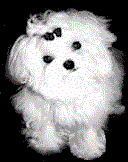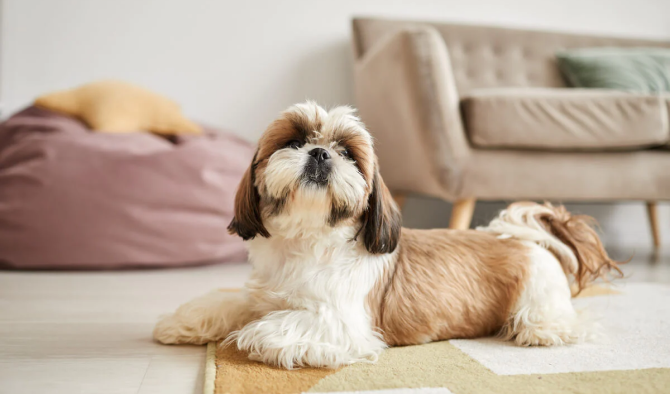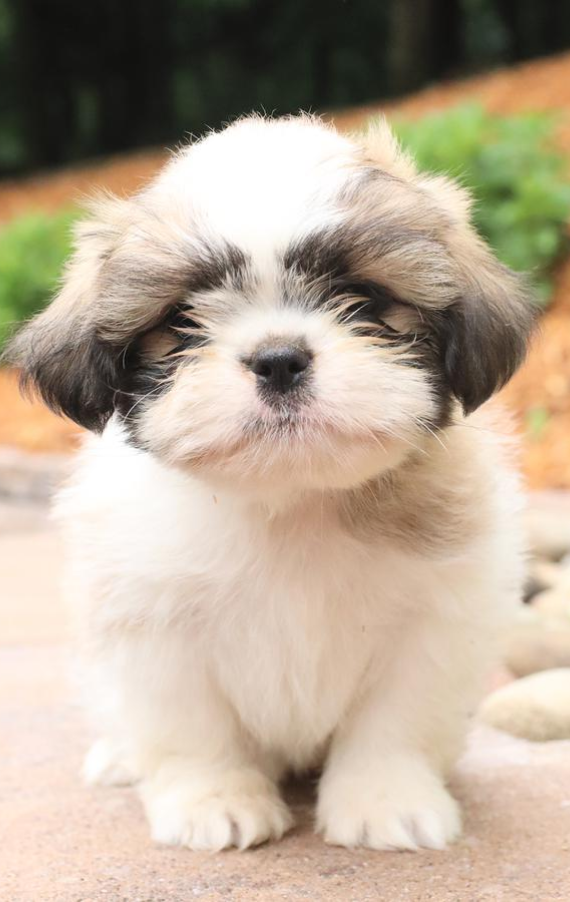

- Phone
- Email puppypetite@aol.com
-
Address
8002 17th Ave, Brooklyn NY 11214

How To House Train A Shih Tzu Puppy
The Shih Tzu is a small, sturdy breed known for its friendly demeanor and luxurious coat. Each characteristic of this breed contributes to its unique charm:


Size and Structure
Shih Tzus are compact and solid, typically weighing between 9 and 16 pounds. Their size makes them suitable for both apartment living and larger homes.
Coat
Recognized for their long, flowing coats, Shih Tzus come in a variety of colors and patterns. Their hair is often grown long for show purposes, but can also be kept in a "puppy cut" for easier maintenance.
Temperament
The Shih Tzu puppy breed is known for their affectionate and friendly nature. They get along well with adults, children, and other pets, making them an excellent choice for families.
Health
This breed is generally healthy but can be prone to certain conditions such as hip dysplasia and eye problems. Regular check-ups and a good diet can help maintain their health.
Exercise Needs
Despite their small size, Shih Tzus are active and require daily exercise. However, their needs can often be met with indoor play and short walks.
Training
Shih Tzus are intelligent and can be trained with consistency and positive reinforcement. Though they can be a bit stubborn, their eagerness to please often wins out.
Each of these features plays a part in the appeal of the Shih Tzu, a breed that is as endearing in character as it is in appearance.

House Training Your Shih Tzu
As dog owners, one of the most important part of your journey with your dog is training. House training your Shih Tzu puppy is a vital phase in your pet's upbringing. Here's a simple guide to help you through:
Establish a Routine
Dogs thrive on consistency. Set a regular feeding and bathroom schedule to help your Shih Tzu understand when it's time to eat and when it's time to go potty.
Identify a Potty Spot
Choose a specific area in your yard as the designated bathroom spot. Consistently take your Shih Tzu puppy here for bathroom breaks to help them understand this is where they should go.
Use a Leash
Keeping your Shih Tzu on a leash during potty breaks can help control the situation and prevent them from being distracted.
Reward Good Behavior
When your Shih Tzu uses the bathroom in the correct spot, reward them with praise, a pet, or a small treat. This positive reinforcement helps them understand they've done something right.
Be Patient and Consistent
House training doesn't happen overnight. It's a process that requires time, patience, and consistent reinforcement. If accidents happen, clean up without any fuss and keep encouraging your pet.
By following these steps, you'll be well on your way to house training your Shih Tzu. Remember, every dog is different, and what works for one might not work for another. So, adjust your approach as needed until you find what works best for your furry friend.
The duration it takes for a Shih Tzu to be fully house-trained can vary based on factors like the dog's age, temperament, and consistency of the training routine. Generally, it could take anywhere from a few weeks, a couple of weeks, to a couple of months for your Shih Tzu to get the hang of house training. Puppies typically have a faster learning curve, as they can adapt to routines and learn new behaviors quickly. Patience and consistency are key; remember, every positive reinforcement brings your Shih Tzu one step closer to being fully house-trained.
Crate Training
Crate training is a method of house training your Shih Tzu puppy that involves the use of a crate or cage. The idea behind it is to make the crate an appealing place for your pet, ultimately becoming a safe haven where they feel comfortable and secure.
In nature, many animals like to have their own den, a small, safe space where they can rest and hide from danger. Dogs, being descendants of wolves, also have this natural instinct. A crate can serve as your dog's den, providing them their own space in your home.
To successfully crate train your Shih Tzu, it's important to ensure the crate is a positive, inviting place. Never use it as a punishment. Begin by introducing your Shih Tzu to the crate slowly. Leave the door open and encourage them to explore it on their own. You can aid this by putting some comfortable bedding and their favorite toys inside.
Once your dog is comfortable with the crate, you can begin using it for short periods while you are home. This could be when you're cooking dinner or doing other chores. The idea is to get your dog used to being in the crate while you're still around.
Over time, you can gradually increase the time your Shih Tzu spends in the crate, eventually using it when you need to leave the house. Always ensure your dog has had a chance to exercise and go to the bathroom before they are crated.
Crate training is an effective training tool, but remember, it's not a solution to leave your dog locked up for long periods. Your Shih Tzu still needs plenty of exercise, interaction, and love from you. It should be a positive space for your pet, not a place of isolation or punishment.
Through patience, consistency, and positive reinforcement, crate training can provide a useful training method for you and a safe, secure space for your Shih Tzu. Being a pet parent isn't always easy but it sure is rewarding.
Potty Training
When you potty train a Shih Tzu puppy, like house training, potty training involves patience, consistency, and positive reinforcement. As a breed known for their intelligence but occasional stubbornness, Shih Tzus can be potty trained effectively when the correct methods are applied.
Start Early and Stay Regular
Ideally, potty training should begin when your Shih Tzu is a puppy, usually around three to four months old. Regular feed schedules and potty times are crucial to help your pet establish a routine.
Frequent Potty Breaks
Small breeds like Shih Tzus tend to have smaller bladders, meaning they may need to go out more often. Puppies may need a bathroom break every hour, while adult Shih Tzus typically require breaks about four times a day. Regular breaks can prevent accidents and teach your Shih Tzu where they are expected to go potty.
Use Command Words
Use specific phrases, like "Go potty," when you take your Shih Tzu to their designated bathroom spot. Over time, your dog will associate this command with the act of going to the bathroom, helping them understand what's expected when they hear the phrase.
Clean Up Accidents Immediately
Accidents will happen during potty training including when you potty train your Shih Tzu. When they do, clean the area thoroughly to eliminate any scent. This can help prevent your Shih Tzu from associating that area with going to the bathroom.
Celebrate Success
Shower your Shih Tzu with praise and treats when they successfully go to the bathroom in the correct spot. This positive reinforcement will encourage them to repeat the behavior.
Each Shih Tzu is unique and may respond differently to various training methods. If a certain approach doesn't seem to be working, don't be discouraged. Try different techniques until you find what works best for you and your pet. With patience and persistence, your Shih Tzu will eventually master potty training, resulting in a happier pet and a cleaner home.

How to Respond to Accidents in Training a Shih Tzu: Common Problems and Solutions
Frequent Accidents
If your Shih Tzu frequently has accidents, it may be an indication that they're not getting enough opportunities to go outside. Increase the number of potty breaks. Remember, puppies may need to go out every hour, while adult Shih Tzus may need to go out four times a day or more.
Accidents Only When You're Not Home
If your Shih Tzu only has accidents when you're not home, it could be a sign of separation anxiety. Try crate training or give your pup an engaging toy to keep them busy while you're away. If the problem persists, consult with a professional dog trainer or a vet.
Submissive or Excited Urination
Some Shih Tzus may urinate when they're overly excited or feeling submissive. This is more common in puppies. Avoid overly excited greetings and don't scold or get angry at your pup when this happens. They'll usually outgrow this behavior as they mature.
Marking Behavior
If your Shih Tzu is repeatedly urinating in small amounts in the same spot, they may be marking their territory. This is more common in unneutered males but can occur in any dog. Neutering often helps, but cleaning the marked areas thoroughly to remove the scent is also important. If the behavior persists, a visit to the vet or a dog trainer may be necessary.
Medical Issues
Sometimes, frequent accidents may be due to underlying medical issues, such as urinary tract infections (UTI), bladder stones, or other health concerns. If your Shih Tzu is having more accidents than normal, has painful urination, or there are other symptoms like loss of appetite or lethargy, seek advice from a vet immediately.
Transitioning From Indoor to Outdoor Training
The whole process. especially when you potty train your Shih Tzu puppy, is challenging. Transitioning your Shih Tzu from indoor to outdoor training can be a challenging process, but with patience and consistency, it can be achieved successfully.

Gradual Introduction
Initially, start by taking your dog outdoors during their regular bathroom times. This practice will help them draw a connection between being outside and the act of relieving themselves.
Reinforce Outdoor Potty Times
Use the same command words you used during indoor training while your pet is outdoors. As they get used to the new location, reinforce their behavior with praise and treats.
Increase Outdoor Time
Gradually increase the amount of time your Shih Tzu spends outdoors, with activities like walks or playtime after successful potty moments. This will create positive associations with being outside.
Temporary Indoor Options
If you're transitioning from pee pads to outdoor training, start by moving the pee pads closer to the door you use to go out. Eventually, place it outside, if possible, to make a clear connection.
Patience is key during this transition as accidents will happen. Ensure you clean up promptly and thoroughly to avoid reinforcing indoor bathroom habits. With time and consistency, your Shih Tzu will be comfortably potty trained to go outdoors.
